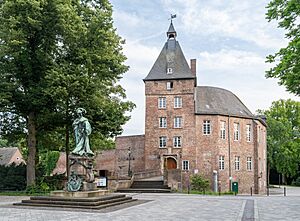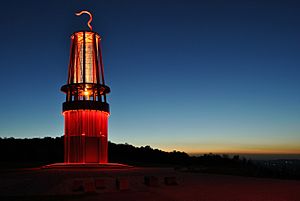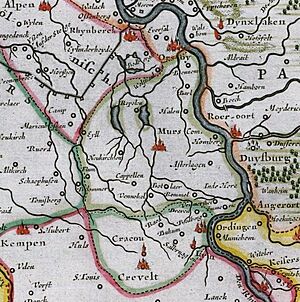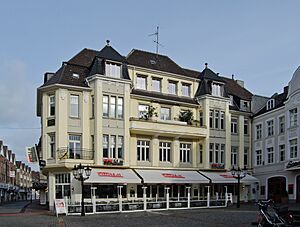Moers facts for kids
Quick facts for kids
Moers
|
|||
|---|---|---|---|

Moers Castle (2024)
|
|||
|
|||
| Country | Germany | ||
| State | North Rhine-Westphalia | ||
| Admin. region | Düsseldorf | ||
| District | Wesel | ||
| Elevation | 23 m (75 ft) | ||
| Population
(2022-12-31)
|
|||
| • Total | 105,287 | ||
| Time zone | CET/CEST (UTC+1/+2) | ||
| Postal codes |
47441 - 47447
|
||
| Dialling codes | 0 28 41 | ||
| Vehicle registration | MO (alternative: WES or DIN) | ||
Moers (German pronunciation: [ˈmœʁs]) is a German city located on the western side of the Rhine river. It is very close to the city of Duisburg. Moers is part of the Wesel district.
Contents
Moers Through Time: A Brief History
Moers has a long and interesting history. It was first mentioned in records around 1186. For a long time, it was known as the county of Moers. This meant it was like a small, independent area within the larger Holy Roman Empire.
During the Eighty Years' War, which was a big conflict in Europe, Moers was often fought over. Spanish and Dutch armies took turns capturing it because it was located near important borders. Eventually, in 1597, it was taken by Maurice of Orange, a famous Dutch leader. Even though Dutch troops were stationed there, Moers did not become a full part of the Dutch Republic.
In 1702, after William III of Orange passed away, the king of Prussia inherited Moers. All Dutch officials and soldiers had to leave the city.
Later, in 1795, France took control of Moers. But after the Congress of Vienna in 1815, Moers was given back to Prussia. Finally, in 1871, it became part of the new German Empire.
During World War II, Moers had a coal mine and a factory that made synthetic oil. These were important targets during the war. After the war, parts of the factory were taken apart.
Meet the Mayors of Moers

A mayor is the leader of a city. They help make important decisions for the people living there. Here are some of the people who have been mayors of Moers over the years:
- 1815–1820: Wilhelm Urbach
- 1822–1830: von Nievenheim
- 1830–1850: Friedrich Adolf Vinmann
- 1850–1859: Karl von Strampff
- 1860–1864: Gottlieb Meumann
- 1864–1897: Gustav Kautz
- 1898–1910: August Craemer
- 1910–1915: Richard Glum
- 1917–1937: Fritz Eckert
- 1937–1941: Fritz Grüttgen
- 1943–1945: Peter Linden
- 1945–1946: Otto Maiweg
- 1946: Karl Peschken
- 1946–1952: Wilhelm Müller
- 1952–1977: Albin Neuse (SPD)
- 1977–1999: Wilhelm Brunswick (SPD)
- 1999–2004: Rafael Hofmann (CDU)
- 2004–2014: Norbert Ballhaus (SPD)
- 2014–: Christoph Fleischhauer (CDU)
Sports in Moers
Moers has a strong sports community. In 1985, the Moers Sports Club was created for volleyball. This team became very successful and even won the Bundesliga championship in 1989.
Famous People from Moers
Many interesting people were born or lived in Moers. Here are a few of them:
- Gerhard Tersteegen (1697–1769), a preacher and poet.
- Georg Perthes (1869–1927), a surgeon and radiologist known for Perthes disease.
- Anna Erler-Schnaudt (1878–1963), a talented singer.
- Hans Dammers (1913–1944), a famous pilot.
- Walter Niephaus (1923–1992), a chess master.
- Hanns Dieter Hüsch (1925–2005), a comedian and writer.
- Hubert Hahne (1935–2019), a racing car driver.
- Helmut Kelleners (born 1939), another racing car driver.
- Herman Weigel (born 1950), a film producer and writer.
- Armin Hahne (born 1955), also a racing car driver.
- Jürgen Renn (born 1956), a physicist and historian of science.
- Helga Trüpel (born 1958), a politician.
- Jörg van Ommen (born 1962), a racing car driver.
- Katja Nass (born 1968), a fencer.
- Stephan Paßlack (born 1970), a football player.
- Christian Ehrhoff (born 1982), an ice hockey player.
- Timo Weß (born 1982), a field hockey player.
- Benjamin Weß (born 1985), also a field hockey player.
- Regina Abelt (born 1954), who was the first lady of Ethiopia for a time.
Moers' Sister Cities
Moers has special friendships with cities around the world. These are called "twin towns" or "sister cities." They often share cultural events and visits. Moers is twinned with:
 Maisons-Alfort, France (1966)
Maisons-Alfort, France (1966) Bapaume, France (1974)
Bapaume, France (1974) Knowsley, England, United Kingdom (1980)
Knowsley, England, United Kingdom (1980) Ramla, Israel (1987)
Ramla, Israel (1987) La Trinidad, Nicaragua (1989)
La Trinidad, Nicaragua (1989) Seelow, Germany (1990)
Seelow, Germany (1990) Stazzema, Italy (2019)
Stazzema, Italy (2019)
See also
 In Spanish: Moers para niños
In Spanish: Moers para niños
 | James B. Knighten |
 | Azellia White |
 | Willa Brown |





